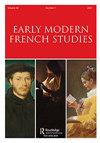‘Quel monstre de vice […] que la langue refuse de nommer ?’: Monsters and the Politics of Naming in La Servitude volontaire (and beyond)
IF 0.2
3区 历史学
Q2 HISTORY
引用次数: 0
Abstract
This discussion conjugates La Boétie’s exploration of the negative valency of ‘la servitude volontaire’ with a set of ancient, early modern, and contemporary images and texts – from Homer and Cicero, through Montaigne and Hobbes, to Racine and Kadir Nelson. The force of ancient example is registered in the repeated haunting of the body politic by the ghost of tyranny: across genres, locations, and times, one generation after another seems to consent to the subjection of body, property, and soul to the tyrant’s cause. Reworking insights and images drawn from La Servitude volontaire, political theorists and dramatists, writers, and artists bear exemplary witness to the dance by which we trace the contours, shapes, and limits of love and (be)longing, community and action, agency and will.“什么邪恶的怪物〔…〕语言拒绝命名?”自愿奴役中的怪物和命名政治(及以后)
这一讨论结合了La bosamtie对“自愿奴役”的负面价值的探索,以及一系列古代、早期现代和当代的图像和文本——从荷马和西塞罗,到蒙田和霍布斯,再到拉辛和卡迪尔·纳尔逊。古代榜样的力量体现在专制幽灵对政体的反复困扰中:跨越类型、地点和时代,一代又一代似乎同意将身体、财产和灵魂臣臣于暴君的事业。政治理论家、戏剧家、作家和艺术家从《自愿奴役》中获得的见解和形象,为我们描绘爱与渴望、社区与行动、能动性与意志的轮廓、形状和界限的舞蹈提供了典范性的见证。
本文章由计算机程序翻译,如有差异,请以英文原文为准。
求助全文
约1分钟内获得全文
求助全文
来源期刊

Early Modern French Studies
Multiple-
CiteScore
0.10
自引率
0.00%
发文量
14
期刊介绍:
Early Modern French Studies (formerly Seventeenth-Century French Studies) publishes high-quality, peer-reviewed, original articles in English and French on a broad range of literary, cultural, methodological, and theoretical topics relating to the study of early modern France. The journal has expanded its historical scope and now covers work on the sixteenth, seventeenth, and eighteenth centuries. Within this period of French literary and cultural history, the journal particularly welcomes work that relates to the term ''early modern'', as well as work that interrogates it. It continues to publish special issues devoted to particular topics (such as the highly successful 2014 special issue on the cultural history of fans) as well as individual submissions.
 求助内容:
求助内容: 应助结果提醒方式:
应助结果提醒方式:


